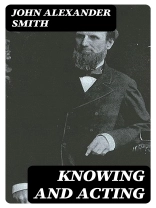In ‘Knowing and Acting, ‘ John Alexander Smith presents a thought-provoking exploration of the interplay between knowledge and action in ethical decision-making. Written in a lucid style enriched with philosophical insights, the book examines various epistemological frameworks, arguing for a nuanced understanding of how knowledge influences moral behavior. Smith deftly navigates historical and contemporary philosophical thought, drawing from figures such as Aristotle and Kant, and intertwining this analysis with real-world examples that resonate with today’s ethical dilemmas. Through a blend of rigorous argumentation and accessible prose, Smith invites readers to reflect critically on their own beliefs and actions. John Alexander Smith, a prominent philosopher and educator, has dedicated his career to studying the intersections of ethics, knowledge, and social responsibility. Influenced by his extensive research in epistemology and moral philosophy, Smith’s perspective is shaped by both his academic training and his personal commitment to fostering a more ethical society. His insights are informed by years of teaching and dialogue with students, where the practical implications of knowledge have continually emerged as a focal point. For readers seeking a deeper understanding of how our knowledge shapes our actions, ‘Knowing and Acting’ offers a compelling framework for examining the moral implications of our beliefs. This book is essential for students, educators, and anyone interested in ethical philosophy, serving as both a guide and a call to action in the pursuit of a more conscientious life.
Giới thiệu về tác giả
John Alexander Smith stands as a distinguished figure in the realm of philosophical literature, having made significant contributions through his seminal work ‘Knowing and Acting.’ Smith’s eloquent dissection of the intricate relationship between epistemology and ethics is both profound and intellectually invigorating. His literary style, marked by clarity and rigor, allows readers to delve into complex philosophical ideas with relative ease. While not much has been popularized regarding his personal history, Smith’s literary output suggests a deep-seated investment in understanding the nuances of human cognition and its implications for moral conduct. The weightiness of his prose, combined with incisive argumentation, attributes to his reputation as a heavyweight in contemporary philosophical discourse. ‘Knowing and Acting, ‘ in particular, has been noted for its coherent narrative that elegantly navigates the often-murky waters between what we understand and how we choose to behave. Through his work, Smith has carved out a unique niche for himself, engaging both academic and lay audiences in a conversation that challenges and refines our perceptions of knowledge and moral agency.












